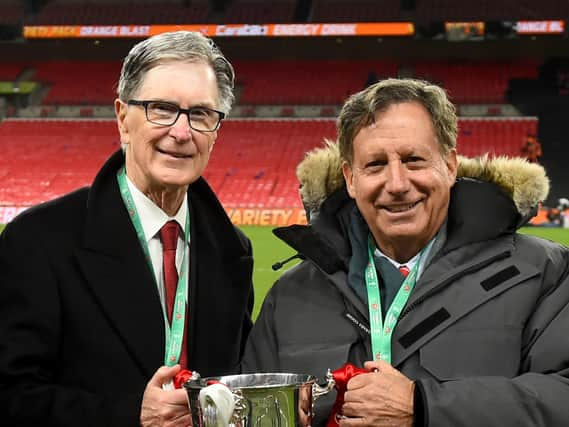Former Liverpool CEO makes FSG sale admission and shares John Henry verdict - 'could cash out'
This article contains affiliate links. We may earn a small commission on items purchased through this article, but that does not affect our editorial judgement.


Fenway Sports Group (FSG) could sell Liverpool whenever they want - but will not because of their love for the club. That is the verdict of Peter Moores, who served as the Reds' chief executive between 2017-2020.
FSG have been owners of Liverpool since purchasing the club for £300 million from the much-maligned Tom Hicks and George Gillett Jr in 2010. Since then, the Reds have restored their status among the European elite. Eight major trophies have been won, including a sixth Champions League in 2019 and a maiden Premier League title the following year. There have also been major renovations of Anfield, with the capacity being increased from around 45,000 to 61,000 while £50 million has been spent on the state-of-the-art AXA Training Centre.
Advertisement
Hide AdAdvertisement
Hide AdJohn Henry is the principal owner of FSG, who are also in charge of MLB team the Boston Red Sox and NHL outfit the Pittsburgh Penguins while they recently helped spearhead a $1.5 billion investment in the PGA Tour.
Henry has largely remained in the background during his 14 years at Anfield. The 74-year-old hasn't been at a home match since a 9-0 thrashing of Bournemouth in August 2022, although he did attend away games at West Ham and Chelsea in April and August 2023 respectively.
And Moores, speaking to talkSPORT last week, revealed that Henry has a deep affinity to Liverpool. Moores said: "He and his wife Linda love coming to Liverpool to watch the games. John is spread a little too thin to be popping over all of the time.
"John is brilliant at identifying opportunities on a major scale in sports - most recently they have invested in the PGA Tour as part of the Strategic Sports Group for $1.5 billion to prop up PGA Tour against LIV Golf.
Advertisement
Hide AdAdvertisement
Hide Ad"They start off with the Boston Red Sox, on a vertical perspective they own New England Sports Network that broadcast the Red Sox games. Two years ago, [they bought] the Pittsburgh Penguins, they are involved in NASCAR with Roush Fenway Racing, It's an amazing group of partners that come together with their personal wealth and FSG has grown enormously.
"When I first met John many years before I became Liverpool CEO, he asked me to come to his apartment. John was going through what I thought were VHS tapes of the 1970s and he was asking me about this Dalglish guy he had been watching hours of footage to understand what the club was all about. He had already purchased the club but was doing his background, going all the way back to the 70s then said I'll be in the 80s next week and then eventually the 90s because he wanted to understand the club at a deeper level than just the numbers and that's who John is.
"He is spread amazingly thin. I always enjoyed having him over. My staff would tell you he would go wandering around Anfield, we'd lose him because he wanted to look at every nook and cranny at what the stadium was all about."
FSG sold a minority stake to Dynasty Equity last September. Liverpool's valuation has increased manifold during the Boston-based group's tenure, with Forbes valuing the club at around £4.2 billion.
Advertisement
Hide AdAdvertisement
Hide AdMoores believes there would not be a shortage of potential suitors who'd all love to purchase the Reds from FSG but it won't happen any time soon.
"He's not the most emotive but when he'd come over, he would analyse the game, he would sit and not say much but there is a deep love there," added Moores. "They could cash out at any time, there's no two ways about it. And why would they? Because they love what they have and realised from the get-go that they were not the owners, they were the stewards. They know who owns the club."
Comment Guidelines
National World encourages reader discussion on our stories. User feedback, insights and back-and-forth exchanges add a rich layer of context to reporting. Please review our Community Guidelines before commenting.